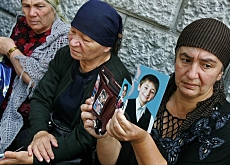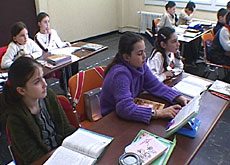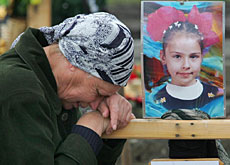Swiss aid continues one year after Beslan siege

One year after the Beslan school siege, Swiss experts say projects they are working on to help people come to terms with the tragedy are beginning to bear fruit.
Switzerland was one of many countries which offered assistance in the wake of the hostage drama in the southern Russian town that claimed the lives of more than 300 people, most of them children.
In the months that followed the Swiss Agency for Development and Cooperation (SDC) launched a number of projects to help the physical and mental recovery of victims.
Hardly a family in the town was untouched by the tragedy, with many losing at least one close relative.
The focus of the projects has been on medium- to long-term care for traumatised Beslan residents. Local psychologists and therapists have been employed to ensure continuity in the care provided.
Stefan Vetter of Zurich University, who leads a psychosocial project in the North Caucasus town, says traumatised children have suffered additional loss after foreign medical workers caring for them left Beslan.
“A ten-year-old boy told me he had a nice Italian psychologist caring for him for two weeks immediately after the tragedy but then he left and the boy felt even more alone than before,” the psychiatrist told swissinfo.
Rehabilitation
At the end of last year the SDC provided funding for a rehabilitation centre offering psychological support to Beslan residents, along with a range of sport and leisure activities. Nine months after it was set up, the centre is attracting an increasing number of visitors.
In July the agency’s regional office in Vladikavkaz launched a series of summer camps for children and young people in the North Ossetian mountains. Climbing, walking and skiing are part of the programme, which aims to help the recovery process among young people and build up their resilience.
The programme is set to resume during the winter holidays and to be repeated next year.
Catering mainly to children, the Beslan psychosocial centre provides counselling to those who want it, but also games, play and art therapy.
“We started off with 60 people taking part and now we have close to 800 – this is a clear sign of success,” said Vetter, whose Zurich University team thought up the idea and monitors the progress of participants.
Steady improvement
Vetter said he and his co-workers had noticed a steady improvement in the condition of the children and adolescents using the centre.
“I really admire them. They are getting back to normal, although that said life for them will never quite return to normal,” he remarked.
Vetter says that in many cases the depression which characterises the first stage in the grieving process is giving way to aggression – a healthy development, in his view. The youngsters displaying aggression, particularly in ball games, can be helped to understand their behaviour and to change it.
For Vetter the children are less of a cause for concern than the parents who have lost one or more children.
“Women who won’t be able to have more children are most traumatised,” he said. “The worry is that the children can become re-infected by their parents’ trauma.”
swissinfo, Morven McLean
On September 1, 2004 gunmen stormed School Number 1 in Beslan taking more than 1,200 hostages.
The hostage-takers set off explosives when Russian special forces stormed the building after three days. More than 330 adults and children died.
Two new schools have been built in Beslan in readiness for the start of the new school year on September 5.
The Swiss-sponsored psychosocial and sport programme for the children in Beslan began on September 15, 2004 and runs until June 30, 2006.
It has a budget of SFr300,000 ($239,000).
The sport, education and resilience building programme runs from July 1, 2005 until December 12, 2007.
It has a budget of SFr230,000.

In compliance with the JTI standards
More: SWI swissinfo.ch certified by the Journalism Trust Initiative


You can find an overview of ongoing debates with our journalists here . Please join us!
If you want to start a conversation about a topic raised in this article or want to report factual errors, email us at english@swissinfo.ch.